
The Archipini are a tribe of tortrix moths. Since many genera of these are not yet assigned to tribes, the genus list presented here is provisional.
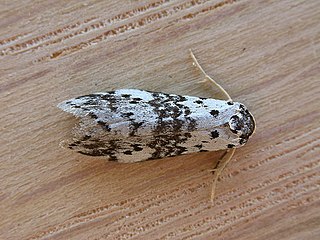
Thallarcha is a genus of moths in the subfamily Arctiinae.

Scoparia is a grass moth genus of subfamily Scopariinae. Some authors have assigned the synonymous taxon Sineudonia to the snout moth family (Pyralidae), where all grass moths were once also included, but this seems to be in error.

Macrobathra is a genus of moths in the family Cosmopterigidae. Most species are endemic to Australia.

The Oecophorinae are the nominate subfamily of moths in the concealer moth family (Oecophoridae). They are part of the insufficiently studied superfamily Gelechioidea, and like their relatives, the circumscription of this taxon is disputed.
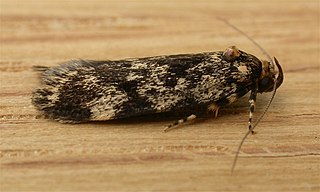
Barea is a genus of moths of the family Oecophoridae. The genus was erected by Francis Walker in 1864.

Acrocercops is a genus of moths in the family Gracillariidae.

Eulechria is a genus of moths of the family Oecophoridae.
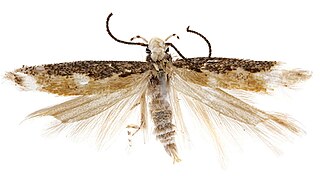
Gelechiinae is a subfamily of moths in the family Gelechiidae. It was described by Henry Tibbats Stainton in 1854.
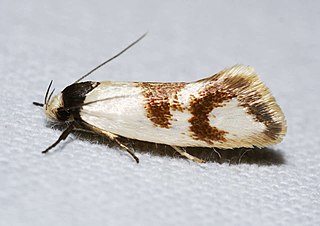
Antipterna trilicella is a species of moth in the family Oecophoridae, first described by Edward Meyrick in 1885 as Ocystola trilicella. It appears to be a moth endemic to Australia and confined to the east coast, occurring in Victoria, New South Wales and Queensland.
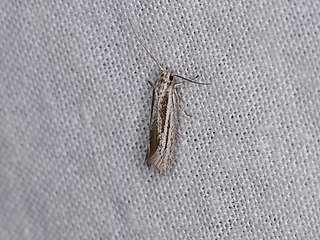
Antipterna ptychomochla is a species of moth in the family Oecophoridae, first described by Alfred Jefferis Turner in 1940 as Antiterpna ptychomochla (sic). The species epithet derives from the Greek, πτυκομοχλοσ, meaning "with bar on fold".

Antipterna euanthes is a species of moth in the family Oecophoridae, first described by Edward Meyrick in 1885 as Ocystola euanthes, with the female lectotype being found in the Wirrabara Forest, South Australia. It appears to be a moth endemic to Australia and in addition to South Australia is also found in Victoria, New South Wales, and Queensland.
Antipterna acrobaphes is a species of moth in the family Oecophoridae, first described by Edward Meyrick in 1885 as Ocystola acrobaphes. The holotype was collected in Sydney, New South Wales, in January 1878.
Antipterna diclethra is a species of moth in the family Oecophoridae, first described by Edward Meyrick in 1885 as Ocystola diclethra. Lectotypes for both Ocystola diclethra and Machaeretis niphoessa were both collected in greater Sydney, New South Wales.
Antipterna glacialis is a species of moth in the family Oecophoridae, first described by Edward Meyrick in 1885 as Ocystola glacialis. The holotype was collected at Mount Lofty, South Australia.
Antipterna lithophanes is a species of moth in the family Oecophoridae, first described by Edward Meyrick in 1885 as Ocystola lithophanes. The lectotype for Ocystola lithophanes was collected at Deloraine, Tasmania. Holotypes for Alfred Jefferis Turner's synonyms were collected from Queensland and New South Wales.
Antipterna naias is a species of moth in the family Oecophoridae, first described by Edward Meyrick in 1902 as Machaeritis naias. The male holotype for Machaeritis naias was collected on Mount Crackenback, New South Wales. The male holotype for Ocystola paralia was collected at Brighton, Victoria.












